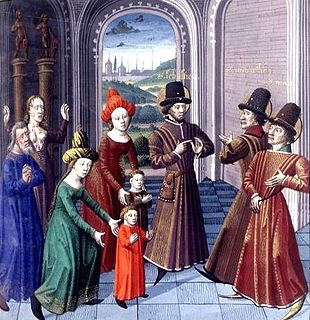
St Ephrem (ca. 306 – 373) was a Syriac deacon and a prolific Syriac-language hymnographer and theologian of the 4th century from the region of Assyria, and is a doctor of the Church.
The readings for his feast in the Roman Office are as follows:
Ephraem was of Syrian descent, and son of a citizen of Nisibis. While yet a young man he went to the holy bishop James, by whom he was baptized, and he soon made such progress in holiness and learning as to be appointed master of a flourishing school at Nisibis, a city of Mesopotamia. After the death of the bishop James, Nisibis was captured by the Persians, and Ephraem went to Edessa. Here he settled first on the mountain among the monks, and then, that he might avoid the great numbers of men who flocked to him, he adopted the eremitical life. He was ordained deacon of the Church of Edessa, but refused the priesthood out of humility. He was conspicuous with the splendour of every virtue and strove to acquire piety and religion by professing true wisdom. He placed all his hope in God alone, despised all human and transitory things, and always longed for the divine and eternal.
When, led by the Spirit of God, he went to Caesarea in Cappadocia, there he saw Basil, that mouthpiece of the Church, and both enjoyed mutual companionship in a suitable manner. In order to refute the countless errors which were rife at that time, and which were troubling the Church of God, and in order to expound zealously the divine mysteries of our Lord Jesus Christ, he wrote many studies in Syrian, almost all of which have been translated into Greek. St. Jerome beareth witness that he attained such fame, that his writings were read publicly in certain churches after the reading from the Scriptures.
His works taken as a whole, so infused with the bright light of learning, brought it about that this holy man, while yet alive, was held in great honour, and was even considered a Doctor of the Church. He also composed songs in verse, in honour of the most blessed Virgin Mary, and of the Saints, and for this reason he was appropriately named by the Syrians the Harp of the Holy Ghost. He was noted for his great and tender devotion towards the immaculate Virgin. He died, rich in merits, at Edessa in Mesopotamia on the 18th day of June in the reign of Valens. Pope Benedict XV, at the instance of many Cardinals of the Holy Roman Church, Patriarchs, Archbishops, Bishops, Abbots, and religious communities, declared him by a decree of the Congregation of Sacred Rites to be a Doctor of the universal Church.You can read more about him in Pope Benedict XVI's General Audience on him.
 |
| C15th (the saints are at the right) |
Theigtheenth of June is also the memorial of SS Mark and Marcellian, matyrs under Diocleian c286. According to their legend, they were twin brothers who were deacons, and refused to offer pagan sacrifices. In prison their parents attempted to persuade them to apostasize; St Sebastian, however, convinced them to stand firm. The entry in the martyrology reads:
At Rome, on the Ardeatine road, in the persecution of Diocletian, the birthday of the saintly brothers Marcus and Marcellian, martyrs, who were arrested by the judge Fabian, tied to a stake, and had sharp nails driven into their feet. As they ceased not to praise the name of Christ, they were pierced through the sides with lances, and thus went to the kingdom of heaven with the glory of martyrdom.
No comments:
Post a Comment